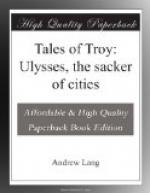But Ulysses only stood in sorrow and anger beside his ship, and never put hand to it, for he felt how disgraceful it was to run away. At last he threw down his mantle, which his herald Eurybates of Ithaca, a round-shouldered, brown, curly-haired man, picked up, and he ran to find Agamemnon, and took his sceptre, a gold-studded staff, like a marshal’s baton, and he gently told the chiefs whom he met that they were doing a shameful thing; but he drove the common soldiers back to the place of meeting with the sceptre. They all returned, puzzled and chattering, but one lame, bandy-legged, bald, round-shouldered, impudent fellow, named Thersites, jumped up and made an insolent speech, insulting the princes, and advising the army to run away. Then Ulysses took him and beat him till the blood came, and he sat down, wiping away his tears, and looking so foolish that the whole army laughed at him, and cheered Ulysses when he and Nestor bade them arm and fight. Agamemnon still believed a good deal in his dream, and prayed that he might take Troy that very day, and kill Hector. Thus Ulysses alone saved the army from a cowardly retreat; but for him the ships would have been launched in an hour. But the Greeks armed and advanced in full force, all except Achilles and his friend Patroclus with their two or three thousand men. The Trojans also took heart, knowing that Achilles would not fight, and the armies approached each other. Paris himself, with two spears and a bow, and without armour, walked into the space between the hosts, and challenged any Greek prince to single combat. Menelaus, whose wife Paris had carried away, was as glad as a hungry lion when he finds a stag or a goat, and leaped in armour from his chariot, but Paris turned and slunk away, like a man when he meets a great serpent on a narrow path in the hills. Then Hector rebuked Paris for his cowardice, and Paris was ashamed and offered to end the war by fighting Menelaus. If he himself fell, the Trojans must give up Helen and all her jewels; if Menelaus fell, the Greeks were to return without fair Helen. The Greeks accepted this plan, and both sides disarmed themselves to look on at the fight in comfort, and they meant to take the most solemn oaths to keep peace till the combat was lost and won, and the quarrel settled. Hector sent into Troy for two lambs, which were to be sacrificed when the oaths were taken.
In the meantime Helen of the fair hands was at home working at a great purple tapestry on which she embroidered the battles of the Greeks and Trojans. It was just like the tapestry at Bayeux on which Norman ladies embroidered the battles in the Norman Conquest of England. Helen was very fond of embroidering, like poor Mary, Queen of Scots, when a prisoner in Loch Leven Castle. Probably the work kept both Helen and Mary from thinking of their past lives and their sorrows.




